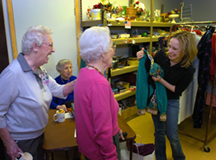
April 6, 2005
Students studying aging can master 2 disciplines with new program
WEST LAFAYETTE, Ind. – Beginning in the fall semester, Purdue is believed to be the first university to offer a dual-title doctorate program that allows students to specialize in aging issues and a related field.

|
"Up until now, Ph.D. students at Purdue and other universities had to choose between a disciplined-based doctoral program in a single discipline, such as sociology, communication or nutrition, or specialize in aging with a doctorate in gerontology," said Gerry Hyner, professor of health and kinesiology and director of Purdue's Gerontology Program. "Purdue now will be offering the first dual-title Ph.D. in gerontology, which allows students a complementary education in both fields. This provides disciplinary depth and interdisciplinary breadth. For example, a veterinary pathobiology student will study life cycles of animal cells, then focus on how aging affects both older animals and adults."
Starting in the fall, doctoral students can combine gerontology with 10 areas that deal with aging issues. Those areas are consumer sciences and retailing; communication; foods and nutrition; health and kinesiology; speech, language and hearing sciences; psychological sciences; sociology; child development and family studies; veterinary clinical sciences; and veterinary pathobiology.
Prospective students can apply for the program, which is offered by the Gerontology Program, a division of the Center on Aging and the Life Course. Interested students may contact one of the participating departments or the Gerontology Program, at (765) 494-9692, for more information.
"Purdue will not only be attracting top graduate students who want to take advantage of this opportunity, but we also will be preparing the first professors who are trained in gerontology and well-versed in their chosen disciplines," Hyner said.
"Take a look at the changing demographics in the United States. We are becoming an older country because individuals are living longer and, as adults age, they face problems that are becoming more complex. How does their ability to communicate affect their quality of life? How does a change in one's sense of smell or taste affect their nutritional habits? Can animals, such as pets, help older adults be more active? We need to develop researchers with in-depth backgrounds in a variety of areas to answer these questions."
Students must complete core coursework in one of the 10 disciplines, as well as required courses in aging, said Margaret Favorite, assistant director of the Center on Aging and the Life Course.
"Students are expected to graduate in about the same amount of time, four to six years, as other doctorate students, even with the additional courses," she said.
The students' advisory committee also must be composed of faculty from their core discipline and interdisciplinary gerontology fields, and students' dissertations must examine an aging-related issue. The program will include opportunities to work with older adult groups in the community as well. Students also have the opportunity to live at Westminster Village, a local retirement facility, to learn more about the aging process as part of Purdue's Bridge Program.
The Gerontology Program, which started in 1996, also offers a minor for graduate students and a certificate for professionals working in areas related to aging. The Center on Aging and the Life Course was established in 2003 with the goal of synthesizing and facilitating collaborative research. More than 40 Purdue faculty and staff are part of the center.
Writer: Amy Patterson-Neubert, (765) 494-9723, apatterson@purdue.edu
Sources: Gerald C. Hyner, (765) 494-9692, ghyner@purdue.edu
Margaret Favorite, (765) 494-5404, favorite@purdue.edu
Purdue News Service: (765) 494-2096; purduenews@purdue.edu
PHOTO CAPTION:
Tetyana Pylypiv, a Purdue graduate student from Ivano-Frankivsk, Ukraine, shops at Westminster Village's weekly flea market with residents Carolyn Risk (standing right), Edna McGinnis (standing left) and Kathryn Harmon (seated). Pylypiv, who will start her dual-title doctorate in the fall in gerontology and sociology after she completes her master's degree, lives in the local retirement facility as part of Purdue's Bridge Program. This is just one of the programs that students in the Gerontology Program can participate in to work directly with older adults. Pylypiv is studying the transition older adults make in retirement and assisted living facilities. The dual-title program allows students a complementary education in both gerontology and one of 10 other related areas. (Purdue News Service photo/David Umberger)
A publication-quality photo is available at https://ftp.purdue.edu/pub/uns/+2005/pylypiv-gerontology.jpg
To the News Service home page